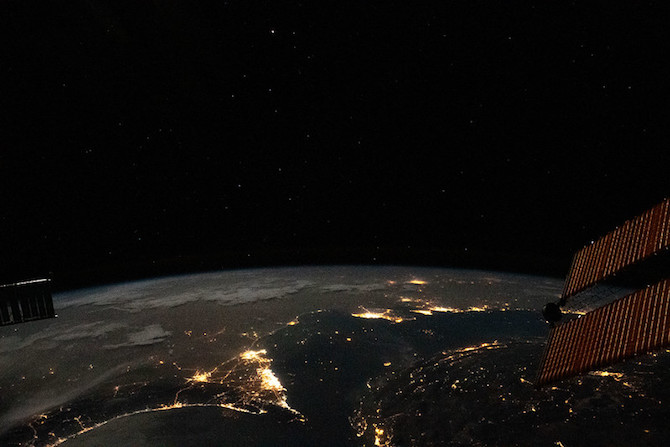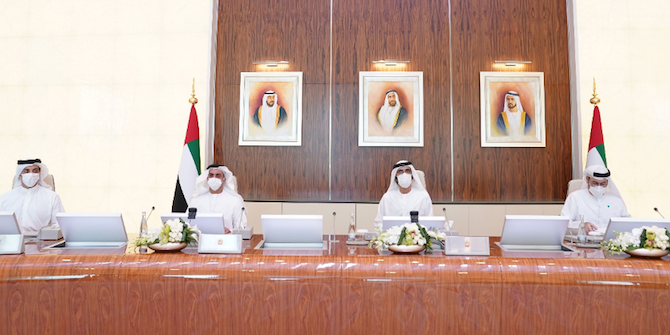by Martin Hvidt

Photographed from the International Space Station at night, the well-lit United Arab Emirates (lower centre) is situated at the northeast end of the Arabian Peninsula, with Qatar and Bahrain to the north. Source: NASA Johnson, Flickr
Despite the highly proclaimed aim of becoming advanced knowledge-based economies, none of the plans and visions published by the governments in the Gulf states defines what a knowledge-based economy is nor provides arguments or more precise reasons why such a development path is the preferred choice for the economies of the Gulf states. This paper intends to construct such an argument and discuss the prospect for a successful transition to a knowledge-based economy.
‘Knowledge’ rose to the top of the development agenda among planners and policy-makers throughout the world and not least in the Gulf during the late 1990’s and 00’s, as a result of the onward march of the Endogenous Growth theory. While knowledge – viewed as a factor of production – has always been a part of production and innovation, it took prominence in the present stage of the global economy, which is increasingly characterised by technological innovations and global competition which has accelerated the speed of innovation. These characteristics are even more explicit in the predecessor to the knowledge-based economy, namely the Fourth Industrial Revolution (4IR), which is ‘a technological revolution that merges the physical, digital and biological technologies in order to deliver unprecedented products and services in new and emerging sectors’, that is, within artificial intelligence, robotics, the Internet of Things, autonomous vehicles, 3-D printing, nanotechnology, biotechnology, materials science, energy storage and quantum computing.
In order to understand the economic arguments behind the Gulf states’ drive to transform into knowledge-based economies it is necessary to include the product life-cycle model and the value-chain approach. The countries have to build the capability to either invent products or to acquire and exploit patents or licenses that will hold the prospect for the Gulf states to enter the product life-cycle in its growth phase and thus enhance the prospect of reaping sizeable profits from the production process. The value-chain approach argues that service activities generally reap higher income than specialisation into manufacturing. Combined with small population sizes among the Gulf countries – besides Saudi Arabia – the specialisation into services activities is the most beneficial economic approach.
The quality of education and general incentives or motivation among the younger segments of the population are the single most constraining factors for the Gulf countries’ transition into knowledge-based economies. In order to promote education especially within science and technology, the UAE and Saudi Arabia are using respectively their Mars mission and the NEOM mega city project to instill aspirational goals for the younger generations within these fields. Furthermore, both projects allow the countries to get first-hand experience in developing and applying the most modern technologies the world has to offer, in order to facilitate the transformation to knowledge-based economies. The rulers in the UAE and Saudi Arabia are not the first leaders that set ambitious and visionary goals with the aim of motivating the citizens to rally behind their goals and to raise the resources to make them a reality. The cost and ambition behind NEOM best compare to the US Space Program which was announced by President John F. Kennedy in 1962 with the words that the US would put a man on the moon before a decade was over and would do so ‘not because [it] was easy but because [it] was hard, [and] because that goal will serve to organise and measure the best of our energies and skills’.
The End of the ‘Oil Era’
The backdrop to the emphasis on transforming to a knowledge economy is that the Gulf states are in a period of economic transition and, according to their development plans and visions, the aim is to transform their economies away from dependence on oil and gas and to become advanced, knowledge based post-oil economies with solid and economically sustainable foundations.
This transition is necessitated not just by the drastic drop in oil prices since the 2014 oil price collapse and the current depressed prices resulting from the Corona pandemic but viewed in a broader perspective due to the realisation that the ‘oil era’ is slowly grinding to a halt. This era should be seen as a historical anomaly in the development of the Arab Gulf states, characterised by vast incomes from oil (and gas), combined with small populations – leaving the populations with a very high oil income per capita. However, both these factors have now changed. Today, the size of the populations has increased manifold and the oil prices are under a long-term downward pressure. Firstly, due to new oil production technologies which bring increased supplies of affordable oil onto the world market (unconventional sources e.g. shale), second due to the global effort to combat climate change implying a strong focus to substitute ‘black’ energy sources with ‘greener’ ones not least in the transport sector. Both factors place a downward pressure on oil prices and thus on the oil incomes received by the Gulf states. From this perspective, the oil bonanza witnessed over the past 50 years seems to be over. Larger populations and increasingly complex and costly societies to run, combined with stagnating or falling incomes from oil, does not allow for a continuation of the previous affluent economic developmental model – the rentier state model.
The end of the ‘oil era’ generally leaves the Gulf countries with no choice than to do what all other countries without sizeable natural resources do, namely to encourage the growth of a productive sector, which creates employment for the population and produces goods and services that satisfy domestic needs and even better, can be sold on the international market and thus create a stream of income. For some of the Gulf countries, this transformation is deemed an urgent matter, notably Saudi Arabia. These are the explicitly stated reasons behind the radical changes envisioned in the Saudi Vision 2030 and the string of reforms implemented over the last couple of years.
However, to transform to knowledge-based economies is no easy task. Ahead is a long hard process where the general educational level has to be increased, where young people need to be incentivised to seek jobs in science and science-related field of studies, and where society provides real incentives to the individual that encourage them to perform at their best.
This is part of a series on the possibilities and obstacles for economic growth, exports and diversification in the GCC states, based on contributions from participants in a closed LSE workshop in June 2021. Read the introduction here, and see other pieces below.
In this series:
- Exports, Diversification and Economic Growth by Kendall Livingston
- Economic Complexity and Exports: Kuwait in the Context of the GCC Region by Margarida Bandeira-Morais, Simona Iammarino and M. Adil Sait
- Growth in the Gulf: Four Ways Forward by Frederic Schneider
- The Role of Economic Complexity in Increasing Exports and Growth by Anis Khayati
- Beyond Oil: Have Manufactured Exports and Disaggregated Imports Contributed to Economic Growth in Kuwait? by Trevor Chamberlain and Athanasia Stylianou Kalaitzi
- The Nexus Between Export Diversification, Trade Openness and Economic Growth in the UAE by Saima Shadab
- Export-Led Growth in the UAE: Causality Between Non-Primary Exports and Economic Growth by Athanasia Kalaitzi, Samer Kherfi, Sahel Al-Rousan and Maria-Salini Katsaiti
- Reaching for the Stars: How and Why do the Gulf States Aim to Transform Their Economies to ‘Knowledge-Based Economies’? by Martin Hvidt






